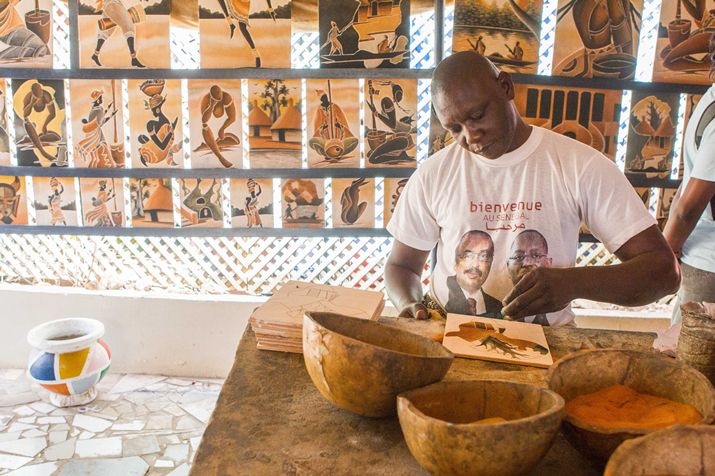|
|||||||||||
|
|
| Speaking the Same Language |
| Kenyan entrepreneur's understanding of Chinese creates a niche in the tourism industry |
| By Yu Nan | VOL. 8 March 2016 |
 |
| Kenya's tourist attractions draw Chinese visitors in large numbers |
"China is no longer an option," reads the banner across Sandra Rwese's personal homepage. "We are dealing with a new reality."
And for the Kenyan tourism consultant, the new reality is that China accounts for the second highest number of tourists from Asia to her country, with nearly 41,000 Chinese arrivals reported in 2015. This year, Kenya Tourism Board hopes to grow that number to a whopping 100,000.
Lending expertise
It' a drive to which Rwese is lending her expertise. The 39-year-old specializes in Chinese tourists and her services are hired by European markets and anyone else wishing to woo Chinese guests.
"My interest in the Chinese market began back in 2008," Rwese's company profile says. "Since then, I've studied the Chinese language, researched their service industry, and also published on trending topics concerning leisure and business travelers." She also opened a consultancy, Chinese Business Trainers, in Nairobi in 2008 to advise and train companies in the tourism and hospitality sector in handling Chinese clients.
"I focus on marketing strategies, rebrand products or services, and provide cross-cultural skills to appeal to Chinese preferences," Rwese told ChinAfrica, explaining her unique selling point.
Her company works with a wide range of customers, from five-star hotel brands and airlines to tour agencies, both online and offline.
"If you want to do business with the Chinese, speak Chinese." That's one of her first tips. "Speaking their language is important for [attending to Chinese] business," she said. "That is the way I [work], so that it brings me an opportunity to work as a citizen of the world, integrating Africans and Chinese."
Rwese studied the Chinese language and culture at the Confucius Institute in the University of Nairobi before relocating to Xiamen City in southeast China's Fujian Province in 2013. There she studied further at the Xiamen University, moving back and forth between China and Kenya. Her consultancy also undertakes translations into Chinese and teaching Chinese business etiquette.
The year 2013 established China as one of the largest sources of outbound travelers. The number of Chinese tourists going abroad reached 100 million, according to official data. It was also estimated that the figure would hit 200 million by 2020.
Social media
Rwese rues that Africa, on the whole, has been slow to capture the Chinese tourism market.
"[African tourism companies] lose great opportunities while dealing with Chinese clients due to lack of understanding of the Chinese culture and language," she said. "However, there are still opportunities in specific segments, such as heritage tourism, backpackers' hostels and eco-tourism."
Like other African countries, she finds Kenya too has not done much to tap the rich pool of Chinese tourists.
"Kenyan service operators rely on traditional marketing strategies like holding exhibitions," she said. "The answer lies in adopting innovative marketing methods that reach as many potential tourists as possible."
According to her, social media represents the future of marketing and is the tool with which to capture the next generation of digitally aware consumers. Chinese interactive social platforms such as WeChat and Weibo attract millions of users daily. "Social platforms' reach is wider and cheaper," she said.
Rwese, who is also director of social media at Gulu and Hirst, a social media tourism firm, has other tips for businesses in the tourism and hospitality industry: establish dedicated teams for emerging markets, network with Chinese tour agents, have loyalty programs, appoint brand ambassadors and promote products and services to build a brand identity.
"Kenya needs Chinese celebrity brand ambassadors, such as Yao Ming [Chinese basketball player who played for the National Basketball Association] and [film star] Jackie Chan, who will help promote Kenya's tourist destinations and culture, leveraging on their massive social media followings in China,?she added.
Innovative branding
Chinese outbound tourism is both tiered and cyclical, varying regionally. Travelers?preferences have significantly changed and today, they pay more attention to trips with interesting themes. Rwese says theme-based branding, therefore, is critical to hospitality services.
"Product innovation is at the heart of competitive advantage and tourism growth," she stressed. "Hardly any universally accepted guidelines exist to help tourism providers successfully navigate the unfamiliar territory they now face, but there are agents that can help them, especially in identifying cluster markets and tour partners within China."
In addition, the local hospitality colleges must equip graduates with skills to serve tourist arrivals.
In her seven years in the profession, Rwese faces one stiff challenge: "Chinese clients still need more time to adapt to independent consultants like myself," she said. "But [despite everything] my work focuses on helping Chinese and African companies and people in the tourism sector understand one another."
|
|||
| Copyright ChinAfrica All right reserved 京ICP备08005356号 |